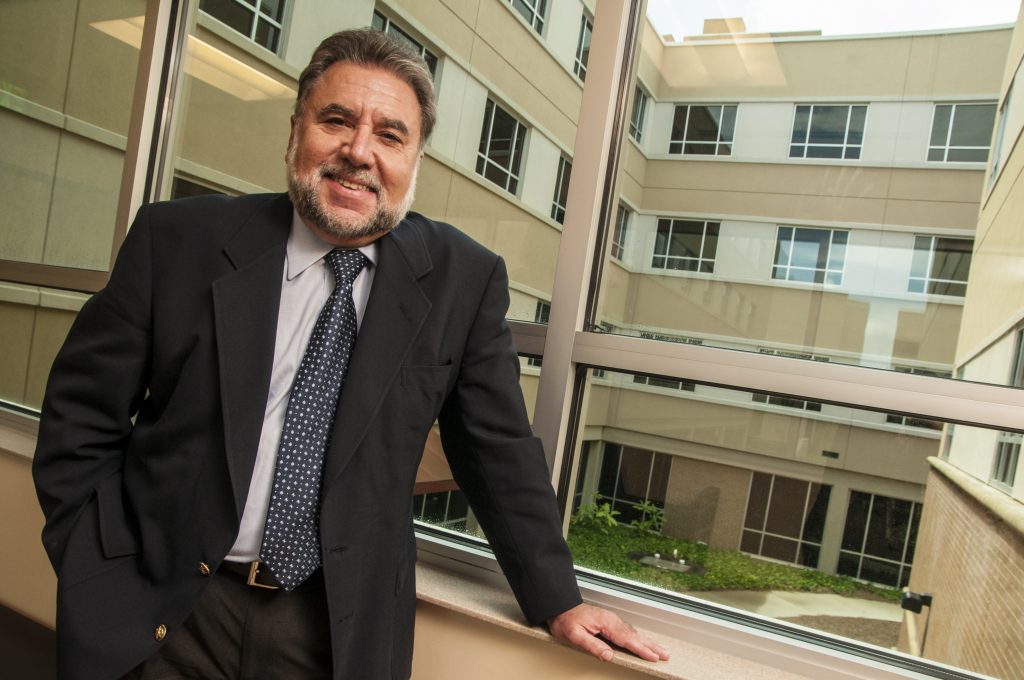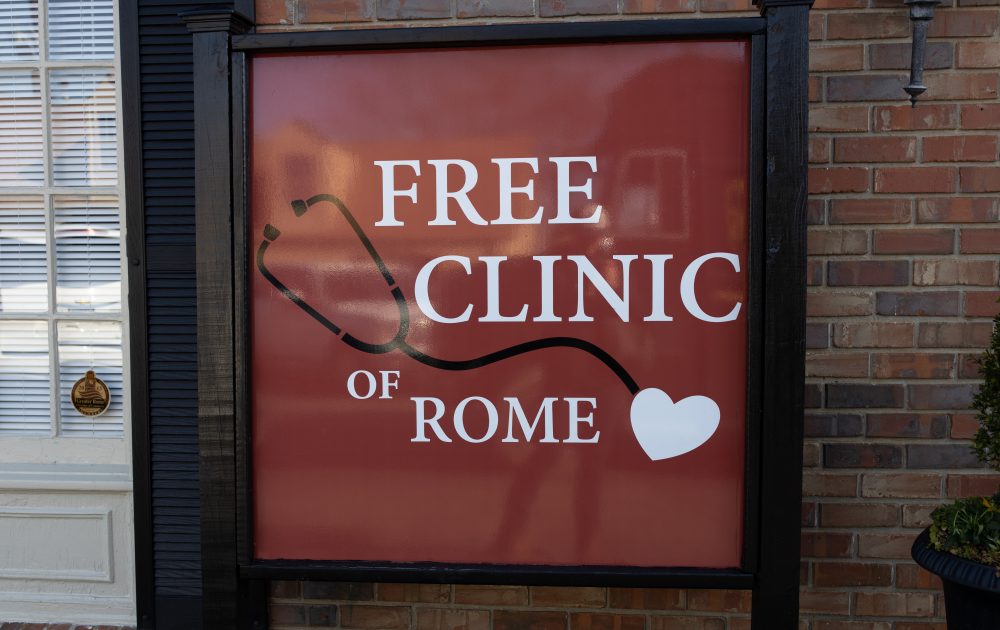
Photo by Derek Bell
With a world of possibility, why did you choose medicine and become a doctor?
Originally, I wanted be an architect. My high school career counselor put me through a series of tests, including solving a Rubik’s cube. Quite quickly both my counselor and I came to the realization that even though I probably would succeed in architecture school, and although any buildings I designed would stand, they would not be original and creative. My other passion was service, and even before I considered architecture, I had wanted to attend the seminary and become a priest. However, being the oldest son, my dad needed for me to pursue a career where I would be able to help support the family. The more I understood how my brain worked, my natural inclination toward science, specifically biology, and my desire to
help others, the more medicine became the obvious choice.
What can you tell the readers about yourself?
AD:I grew up in a blue-collar family, the oldest of four children, with a Cuban father who held traditional values. He always said people fall somewhere on the ladder of life, and our responsibility was to assist those below by giving them a hand up to a higher rung. Because of this instilled belief, I am a team player, I am a constant learner, and I am a Doctor. Helping others has always been one of the central core values of our family.
You graduated from the University of Miami School of Medicine, so how did you end up in Rome, Georgia?
AD:After graduating from medical school in 1977, I did my internal medical residency at Jackson Memorial Hospital affiliated with the University of Miami School of Medicine and after a year as Chief Medical Resident I completed a two year Cardiology Fellowship. I subsequently joined a single specialty Cardiology Group “Cardiology Diagnostic Associates” and grew my private practice and was very content for almost 10 years albeit working very long hours and managing two separate offices. My sister married an air traffic controller and was living in Fayetteville GA and she had always wanted for me to come up to Georgia and visit. My accountant advised me to take the trip, and to go to a conference, or schedule an interview, and incorporate professional development with the family visit. There was an opening in Rome for an echocardiology position, and I decided to apply. After three hours of driving on I-285 and seeing the “Gold Dome” several times, I stopped at a gas station to ask directions and became concerned when the attendant had no idea where Rome was, even telling me I was in the wrong country. Thankfully, a police officer came along and had me follow him to SR 41 and I made it safely to Rome. I fell in love with Rome. I fell in love with the job opportunity. I fell in love with the creative challenges it presented, and I fell in love with the Harbin Clinic.
You have worked at Harbin Clinic for 25 years. When you think back on this season of your life, what will stand out the most?
AD:The people. We had a staff meeting a few nights ago and I pointed out to everyone how much talent we had in the Harbin Clinic with graduates from all over the world and from prestigious academic institutions.
With such high caliber physicians already in Floyd County prior to my arrival and also with me being hired as the point person for developing echocardiology at Harbin, the challenge and the creativity it would require appealed to me. You look now and we have 4 certified labs; we have 12 certified echo techs, and we perform all echocardiographic imaging modalities including Pediatrics. It’s great to look back and see all the progress. It sort of makes one feel like the guy who created Las Vegas. It was a desert. Then he made Vegas. This was however a team effort and we would have never accomplished what we did without the engagement of dedicated, persevering, and hardworking folks.
After so much time at Harbin, why the transition to Kindred?
AD:As I was preparing for retirement from Harbin, I went to say goodbye to Chad Lovett, the former CEO of Kindred Hospital, who was moving back to Texas to be closer to family. I expected us to have a five-minute visit because I was only going over to say goodbye. However, when I walked into the lobby at Kindred, I saw a portrait of Tony Warren, a brilliant pulmonologist, dear friend, and mentor of mine. He was one of the smartest guys I’ve ever known and responsible for the creation of the LTAC many years earlier. I was standing there looking at Tony’s portrait, and I must have been caught up with my thoughts because several employees came by to ask me, “ How may we help you, sir?” Eventually, I went to Chad’s office and said to him, “Chad, tell me everything you can about Kindred.” The more I heard, the more enthralled I became. Their value system on patient care and on quality service lined up so closely with the Harbin Clinic philosophy.
How will your professional experience and expertise as a cardiologist and Chief Medical Officer serve Kindred?
AD:I bring a clinical perspective to Kindred. Currently, I believe I will be the only CEO of a Kindred Hospital who is also a physician. I can empathize and walk in the shoes of nurses. I know how to work with pharmacists. I understand the daily life of a medical unit and how allied health personnel work; and I’m obviously very familiar and feel comfortable working alongside other physicians. However, I am going to be re-entering a learning phase of my life, as over the next six months, I become fully immersed in the new culture. Thankfully, Chad assembled a phenomenal team, with tremendous leaders for each department. As the point person, I want to be a resource to the existing experts. With Jennifer Johnstone as Chief Clinical Officer officer, Kody Kimms in charge of pharmacy, along with many other specialists, I want to facilitate the excellent work already being accomplished. It’s an incredible hospital and physical plant already, but for me, it just makes the challenge of improving the facility even more worthwhile.
You’ve spoke a lot about your passion for creativity, your style of leadership, and your heart for service. How does this all fit together moving forward?
AD:I have a lot to learn; I have never managed a hospital before, but I have lived in many hospitals for a long time. For me, as I approach new challenges, I am not relying on my intelligence quotient. I am not relying on my emotional quotient. Instead, I am depending on my CQ, my collaborative quotient and ultimately my SQ or my synchronization quotient which attempts to balance as needed all of these different social dimensions. Everybody is smart, just smart in different areas. Everyone brings a different skill set to the team. We plan to harness that strength in diversity to do great things and make excellent patient care our clear focus. At Kindred, I don’t want to be sitting in my office. 90% of the time, I want to be out in the community, visiting patients and their families, interacting with staff members. I want to have those conversations with our patrons, asking them how we can better meet their needs.
Specifically, can you share any steps you will take to better meet those needs?
AD:I know there will be a learning curve. However, I have always been a life-long learner, and to come up against something I don’t know or understand fully yet, well that challenge perfectly fits my personality. I want to be a resource for the hospital staff and I hope to rectify any issues affecting its optimal functioning. One specific example is the dictation center, the facility where doctors can look up patient information, which currently only has one computer. A staff member brought this to my attention and to remove this bottleneck, we are adding some more computers. Small steps yet constant improvement. I may not have become an architect, but I believe I am contributing to a lasting structure. VVV



